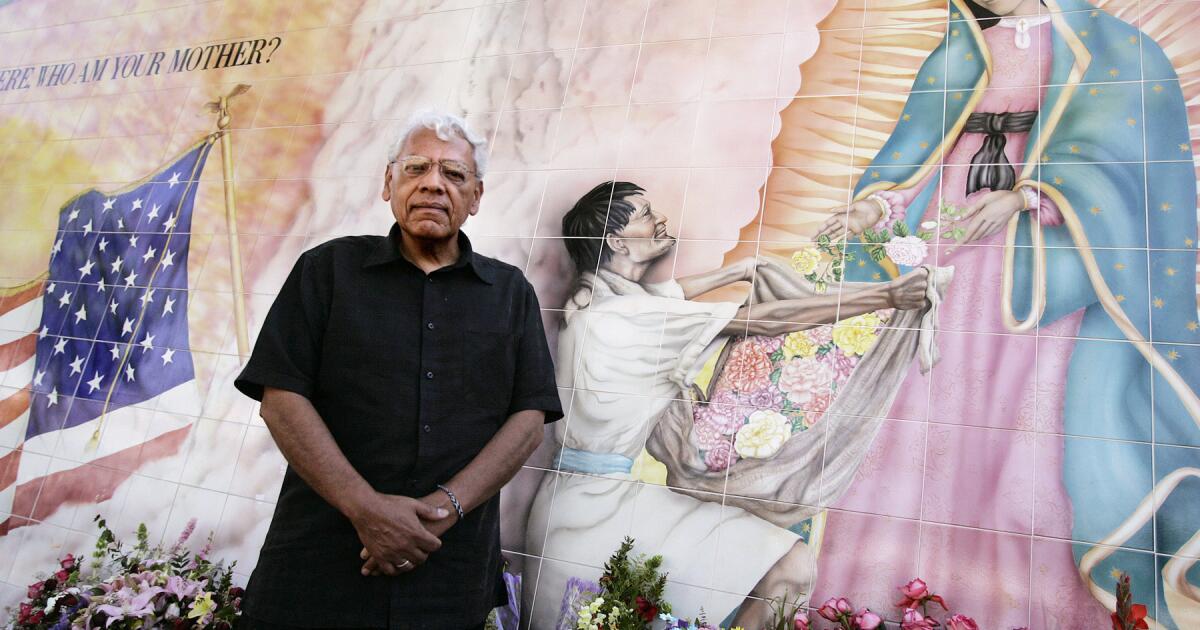Father Richard Estrada, a leading figure in the immigrant rights movement who was known for opening Los Angeles’ first shelter for homeless migrant youth and dedicating his life to advocating for the downtrodden, died Monday at the age of 83.
Estrada was hospitalized in March for pneumonia after contracting COVID-19, and he died from COVID-related complications, according to Angie Jimenez, a family friend.
Estrada, the son of Mexican immigrants, was born in Los Angeles on March 1, 1942. His father worked as a welder and his mother cleaned office buildings. He devoted his adult years to championing the causes of people he believed were treated as second-class citizens, including immigrants, farmworkers, women and members of the LGBTQ+ community.
Estrada was a tireless advocate for migrants who crossed into the U.S. illegally to flee violence and poverty, find work and provide for their families. Over 30 years of activism, he helped deliver thousands of gallons of water to migrants traversing the desert along the border, offered his church as sanctuary for people threatened with deportation, and mortgaged his home to raise money for Jovenes Inc., the nonprofit migrant youth organization he founded.
From 1977 to 2014, Estrada served as an associate pastor at Our Lady Queen of Angels, a Catholic church known as La Placita, before leaving to join the Episcopal Church, saying he felt its tenets better aligned with his values.
“Father Richard Estrada was a visionary,” Andrea Marchetti, executive director of Jovenes, said. “His sense of humanity and his unconditional commitment and love for the most vulnerable were the guiding principles for all the actions he led, no matter the challenges he faced in his later years.”
Jovenes Inc. began organically as Estrada, in the late 1980s, started seeing young migrants showing up at his church on Olvera Street without parents or support. He opened his home in East Los Angeles to many of them before founding Jovenes in 1989. With Estrada’s support, the operation has flourished and expanded over the years into a vibrant Boyle Heights campus offering a continuum of services spanning housing, healthcare, education and career development for 700 young people, ages 18 to 24.
In a 2015 profile, he told The Times that he was guided by the concept of la posada — meaning inn or lodging. “I’m into giving shelter,” he told reporter Kate Linthicum.
At La Placita, he opened the church’s doors to shelter migrant youth during a time of tense discourse about immigration, and federal officials accused him of promoting illegal behavior. He handcuffed himself to a federal building to bring attention to the plight of immigrants in detention, the first of about a dozen times he would be arrested for civil disobedience, Jimenez said. His last arrest happened in 2023, at age 81, as he marched for workers’ rights.
He also opened his La Placita church to weekly HIV testing, working with Richard Zaldivar, founder of The Wall Las Memorias Project, at a time when the Catholic Church was not welcoming to the LGBTQ+ community. Zaldivar remembers asking Estrada if he was worried about getting in trouble.
“He was like a shooting star; he didn’t give a damn,” Zaldivar recalled. “He inspired so many people to believe that you could change the community and change systems by raising your voice and organizing. He also inspired people to believe in their faith — faith in God, but also the faith in yourself that you can create a better community.”
In the 1970s, Estrada organized for farmworker rights alongside Cesar Chavez and Dolores Huerta, participating in marches for the United Farm Workers and organizing grape boycotts in East Los Angeles. He was a key figure in the Chicano movement, lending his stature as a religious leader to advocate for underserved communities.
When he advocated to open the first shelter for undocumented youth, hundreds of people showed up in opposition, recalled state Sen. Maria Elena Durazo, who represents central and East L.A. “He remained calm, understanding their fears, but reminding everyone about our humanity.”
Actor Edward James Olmos said he got to know Estrada through their shared interests in immigrant rights and speaking to incarcerated youth. Over the years, Estrada leaned on Olmos to support various causes, and Olmos often answered that call. “OK, Father, we’re on our way,” he would tell Estrada.
Olmos said he remembers Estrada voicing frustrations as it grew clear that ranking members of the Catholic Church had covered up sexual abuse of children, an episode that contributed to his decision to leave the institution — and another example of his conviction to speak his mind.
“He was one of the greatest human beings that I’ve run across in my lifetime,” Olmos said.
As a minister at the Church of the Epiphany, an Episcopal church in Lincoln Heights, Estrada baptized Jimenez when she was a child, and later baptized her two daughters. He was present through difficult moments, she said, including her sister’s death, offering comfort and guidance.
“It was almost like you were next to a saint. When you were around him it was one of the most comforting feelings,” she said.
Estrada remained an active presence at Jovenes as board president until early this year. Just after his birthday on March 1, he fell ill and was diagnosed with COVID-19 and pneumonia, Jimenez said. He died on Cesar Chavez Day.
